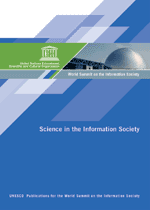
Susan Schneegans (editor), UNESCO Publications for the World Summit on the Information Society, UNESCO, 2003.
Download the full 86 page document as a PDF file.
"The emergence of the information society is a revolution comparable to the deep transformation of the world engendered by the dual inventions of the alphabet and the printing press.
Walter Erdelen (Assistant Director-General for Natural Sciences, UNESCO)
From the Overview:
"In much the same way that the printing press has expanded human outreach, so the Internet is spreading its net ever wider to envelop an ever greater number of human beings; it is changing existing rules of how we acquire information, modifying the way people access new knowledge, accelerating procedures and, at the same time, triggering novel values, trends and challenges. The term ‘information society’ was coined at the turn of the century to describe a society in which information and communication technologies (ICTs) have become an integral part of daily life. It has become second nature to millions of people around the world to use ATM banking machines, listen to a radio, carry a mobile phone, surf the Internet or consult their e-mail inbox, to cite but a few examples.....
"Sir Roger Elliot, Chair of the Executive Board of the International Council for Science (ICSU) stresses the role scientists play in the development of ICTs, the foundation of the information society. ‘Scientific research, full and open access to scientific information for scientists and improved science education and training’, Elliot says, ‘are all important for raising public understanding of science, in order to enable society to make more informed decisions’
‘The application of scientific knowledge continues to furnish powerful means for solving many of the challenges facing humanity, from food security to diseases such as AIDS, from pollution to the proliferation of weapons’, says United Nations Secretary-General Kofi Annan6. “Recent advances in information technology, genetics and biotechnology hold extraordinary prospects for individual well-being and humankind as a whole. At the same time, the way in which scientific endeavours are pursued around the world is marked by clear inequalities. Developing countries, for example, generally spend much less than 1% of their gross domestic product on scientific research, compared to between 1.5% and 3% in wealthy countries. The number of scientists in proportion to population in the developing countries is 10–30 times smaller than in developed countries’. The great majority of new science is created in the North ‘and much of this – in the realm of health, for example – neglects those problems that afflict most of the world’s people’"
No comments:
Post a Comment